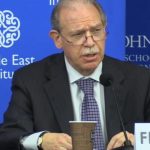
Iraq Energy Institute was honoured to partner with the London Energy Club for their 8th Summit: The Future of Oil in the Middle East: Building Diversified Economies in an Age of Energy Transition. The webinar took place on July 28th with the following participants:
- Adam Sieminski, President, King Abdullah Petroleum Studies and Research Center (KAPSARC)
- Yesar Al-Maleki, Managing Director, Iraq Energy Institute
- Adel Abdellatif, Deputy Director, UNDP Regional Bureau for Arab States
- Michal Meidan, Director, China Programme, The Oxford Institute of Energy Studies
- Gerald M. Feierstein, Senior Vice President, Middle East Institute
- Karim El Aynaoui, President, Policy Center for the New South
The webinar was moderated by Mehmet Öğütçü, Chairman, The London Energy Club and Global Resources Partnership, UK.
Oil-dependent Middle Eastern economies face a monumental task: as the global energy mix continues to transition, they must manage this change while diversifying away from hydrocarbon reliance. Job creation programs must be scaled up rapidly, but also sustainably. Governance challenges must be addressed while the social contract is maintained.
This is a multi-sided challenge in the post-COVID environment where low demand, volatile prices, climate change commitments, worldwide recession and geopolitical tensions severely impact these economies. This diverse group of countries ranges from Algeria in the west to Iran in the east and also includes the six Gulf Cooperation Council countries as well as Iraq, Libya and Yemen. But the mountain they have to climb is the same.
Oil exporters in the Middle East and North Africa region are expected to suffer a $270 billion slump in oil revenues this year, according to the latest projections from the International Monetary Fund. This is a dramatic downturn that will aggravate existing economic and humanitarian challenges and raise already-high poverty levels. In an effort to shore up prices, OPEC and other allied producers such as Russia have agreed on record production cuts, which have further reduced their income.
But the news is not all bad: most MENA countries still have some fiscal tools to buy time before overhauling their economies, and some are already pioneering renewable efforts, kickstarting their digital economies and drafting new investment laws. But the urgency of this task has never been greater.
Download Presentation by Yesar Al-Maleki
















